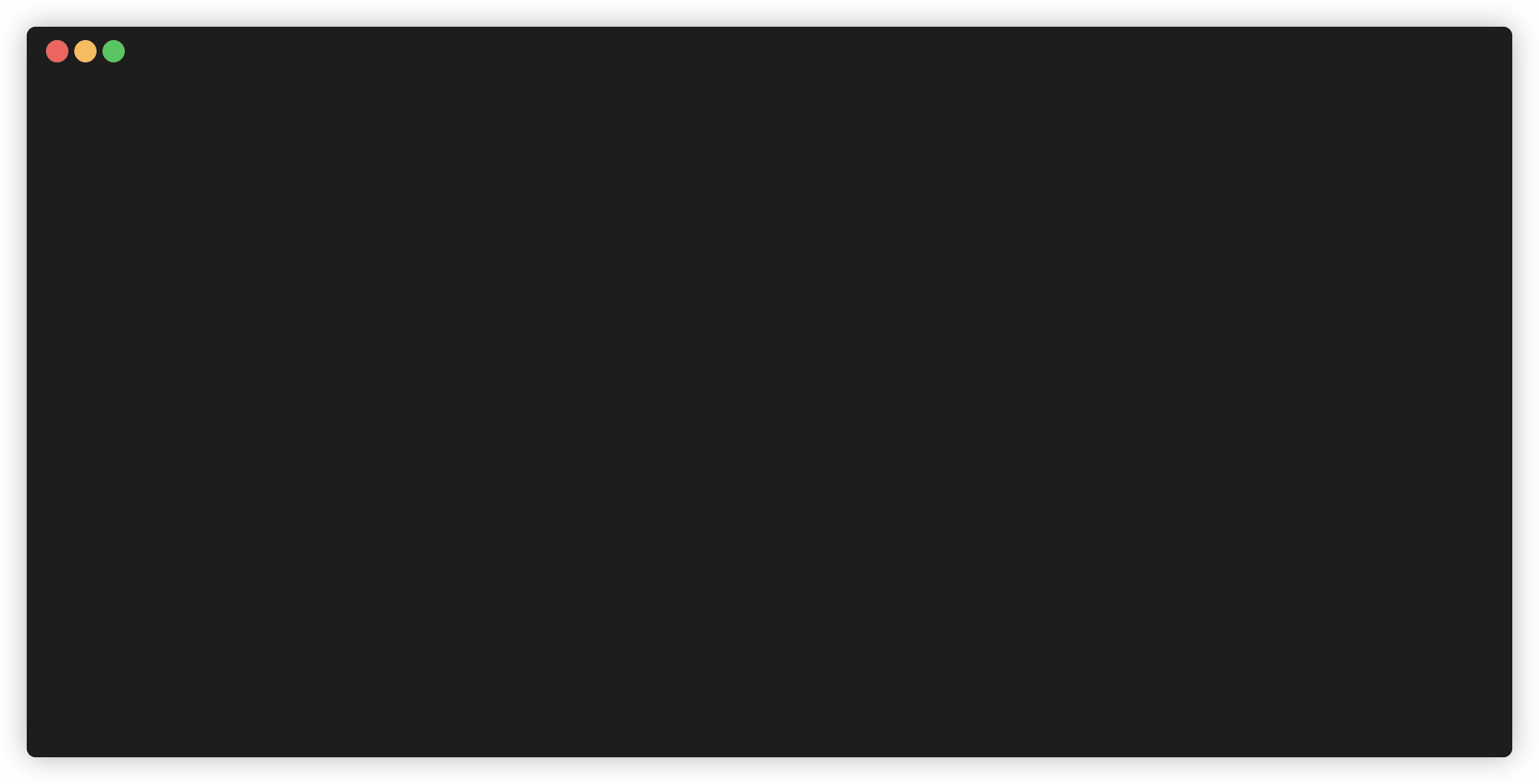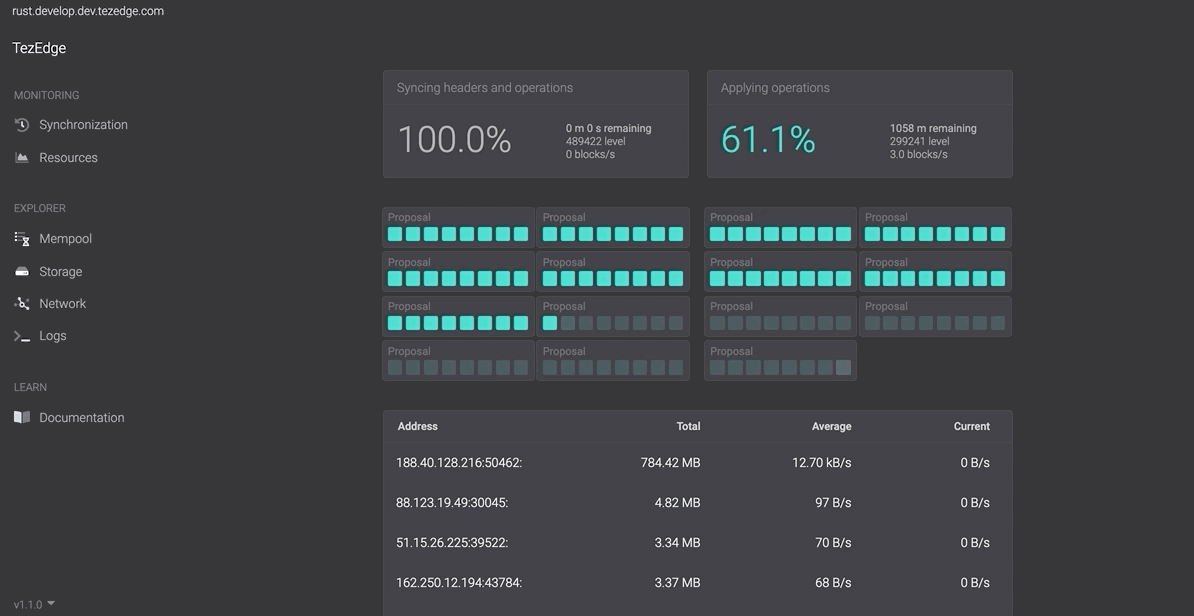The purpose of this project is to implement a secure, trustworthy and open-source Tezos node in Rust.
In addition to implementing a new node, the project seeks to maintain and improve the Tezos ecosystem wherever possible.
| CI / branch | master | develop |
|---|---|---|
| GitHub Actions | ||
| Drone |
This demo launches two items:
- The TezEdge node (p2p application), which connects to the Tezos Mainnet network.
- The TezEdge explorer (web application), which connects to the TezEdge node and can be accessed from a browser to see what is going on inside the TezEdge node
If you want to run this demo, you need to first install the following:
- Git (client)
- Docker
- Download the TezEdge source code
# Open shell and type this code into the command line and then press Enter: git clone https://github.com/tezedge/tezedge cd tezedge - Run docker (compose)
# Open shell and type this code into the command line and then press Enter: docker-compose pull docker-compose up
- Open your web browser by entering this address into your browser's URL bar: http://localhost:8080

Docker for Windows
The images use the hostname localhost to access running services.
When using docker for windows, please check:
docker-machine ip
and make sure that port forwarding is set up correctly for docker or use docker-machine resolved ip instead of http://localhost:8080
TCP ports (<host_port>:<docker_port>):
- "80:80"
- "4927:4927"
- "18732:18732"
- "19732:9732"
Detailed project's documentation can be found here Documentation
We are linking Rust code with a pre-compiled Tezos shared library. For your convenience, we have created pre-compiled binary files for most of the more popular Linux distributions:
| OS | Versions |
|---|---|
| Ubuntu | 16.04, 18.04, 18.10, 19.04, 19.10, 20.04, 20.10, 21.04, 21.10, 22.04 |
| Debian | 9, 10 |
| OpenSUSE | 15.1, 15.2 |
| CentOS | 8 |
| MacOS | experimental - newer or equal to 10.13 should work, Intel and M1 cpus |
If you are missing support for your favorite Linux distribution, please submit a request with the tezos-opam-builder project.
To build from source please follow these instructions.
If you want to build from source code, you need to install this before:
- Install Git (client)
- Install Rust command (We recommend installing Rust through rustup.)
# Run the following in your terminal, then follow the onscreen instructions. curl https://sh.rustup.rs -sSf | sh - Install Rust toolchain (Our releases are built with 1.58.1.)
rustup toolchain install 1.58.1 rustup default 1.58.1 - Install required OS libs
- OpenSSL and Zlib
sudo apt install openssl libssl-dev zlib1g- Sodiumoxide package:
sudo apt install pkg-config libsodium-dev- RocksDB package:
sudo apt install clang libclang-dev llvm llvm-dev linux-kernel-headers libev-dev- In macOS, using Homebrew:
brew install pkg-config gmp libev libsodium hidapi libffi- Sandbox/wallet requirements:
sudo apt install libhidapi-dev
-
Download TezEdge source code
# Open shell, type this code into the command line and then press Enter: git clone https://github.com/tezedge/tezedge cd tezedge -
Build
export SODIUM_USE_PKG_CONFIG=1 cargo build --releaseThe node can built through the
cargo buildorcargo build --release, be aware, release build can take much longer to compile. -
Test
export SODIUM_USE_PKG_CONFIG=1 export DYLD_LIBRARY_PATH=$(pwd)/tezos/sys/lib_tezos/artifacts # currently needed for macOS cargo test --release
To run the node manually, you need to first build it from the source code. When put together, the node can be run, for example, like this:
cargo build --release
cargo run --release --bin light-node -- --config-file ./light_node/etc/tezedge/tezedge.config --protocol-runner=./target/release/protocol-runner --network=mainnet
All parameters can also be provided as command line arguments in the same format as in the config file, in which case they have a higher priority than the ones in the config file. For example, we can use the default config and change the log file path:
cargo build --release
cargo run --release --bin light-node -- --config-file ./light_node/etc/tezedge/tezedge.config --log-file /tmp/logs/tezdge.log --protocol-runner=./target/release/protocol-runner --network=mainnet
Full description of all arguments is in the light_node README file.
For Linux systems, we have prepared a convenience script to run the node. It will automatically set all the necessary environmnent variables and then build and run the TezEdge node.
All arguments can be provided to the run.sh script in the same manner as described in the previous section.
To run the node in release mode, execute the following:
KEEP_DATA - this flag controls, if all the target directories should be cleaned on the startup, 1 means do not clean
KEEP_DATA=1 ./run.sh release --network=mainnet
The following command will execute the node in debug node:
KEEP_DATA=1 ./run.sh node --network=mainnet
To run the node in debug mode with an address sanitizer, execute the following:
KEEP_DATA=1 ./run.sh node-saddr --network=mainnet
You can use the docker version to build and run node from the actual source code.
- you can experiment and change source code without installing all requirements, just docker.
- you can build/run node on Windows/OSX
- this is just for development, because docker is based on full Linux (pre-build docker images are Distroless)
If you do not need to build from souce code, just use our pre-build docker images
./run.sh docker --network=mainnet
Listening for updates. Node emits statistics on the websocket server, which can be changed by --websocket-address argument, for example:
KEEP_DATA=1 ./run.sh node --network=mainnet --websocket-address 0.0.0.0:12345
Full description of all arguments is in the light_node README file.
Note: This cmd runs from the main git sources directory
LD_LIBRARY_PATH=./tezos/sys/lib_tezos/artifacts ./target/release/light-node \
--network "mainnet" \
--identity-file "/tmp/data-dir-mainnet/identity.json" \
--identity-expected-pow 26.0 \
--tezos-data-dir "/tmp/data-dir-mainnet/context_data" \
--bootstrap-db-path "/tmp/data-dir-mainnet/tezedge_data" \
--peer-thresh-low 30 --peer-thresh-high 45 \
--protocol-runner "./target/release/protocol-runner" \
--init-sapling-spend-params-file "./tezos/sys/lib_tezos/artifacts/sapling-spend.params" \
--init-sapling-output-params-file "./tezos/sys/lib_tezos/artifacts/sapling-output.params" \
--p2p-port 9732 --rpc-port 18732 \
--tokio-threads 0 \
--ocaml-log-enabled false \
--tezos-context-storage=irmin \
--log terminal \
--log file \
--log-level info \
--log-format simple
We provide automatically built images that can be downloaded from our Docker hub. For instance, this can be useful when you want to run the TezEdge node in your test CI pipelines.
tezedge/tezedge:vX.Y.Z- last versioned stable released versiontezedge/tezedge:latest-release- last stable released versiontezedge/tezedge:latest- actual stable development versiontezedge/tezedge:sandbox-vX.Y.Z- last versioned stable released version for sandbox launchertezedge/tezedge:sandbox-latest-release- last stable released version for sandbox launchertezedge/tezedge:sandbox-latest- last stable released version for sandbox launcher
More about building TezEdge docker images see here.
docker run -i -p 9732:9732 -p 18732:18732 -p 4927:4927 -t tezedge/tezedge:v3.1.1 --network=mainnet --p2p-port 9732 --rpc-port 18732
A full description of all arguments can be found in the light_node README file.
Just press Ctrl-c, works for e.g. cargo run or run.sh script.
Or you can send a signal to a running process, the dedicated signal is SIGINT, e.g.:
kill -s SIGINT <PID-of-running-process-with-light-node>
Open shell, type this code into the command line and then press Enter:
curl localhost:18732/chains/main/blocks/head
For a more detailed description of the RPCs, see the shell and the protocol endpoints.
- Using Tezedge external baker
- Using Tezedge embedded baker
- Baking in the Ithaca testnet
- Baking in the mainnet
Last released version:
docker-compose -f docker-compose.yml pull
docker-compose -f docker-compose.yml up
(optional) Environment configuration:
# (default: irmin) - choose context implementation, possible values: [irmin, tezedge, both]
TEZOS_CONTEXT_STORAGE=<possible-value>
# explorer accesses node/debugger on 'localhost' by default, you can change it like,
NODE_HOSTNAME_OR_IP=<hostname-or-ip>
e.g.:
TEZOS_CONTEXT_STORAGE=irmin NODE_HOSTNAME_OR_IP=123.123.123.123 docker-compose -f docker-compose.yml up
Last released version with TezEdge Debugger with integrated eBPF
This requires Linux kernel at least 5.11
docker-compose -f docker-compose.debug.yml pull
docker-compose -f docker-compose.debug.yml up
(optional) Environment configuration:
# (default: irmin) - choose context implementation, possible values: [irmin, tezedge, both]
TEZOS_CONTEXT_STORAGE=<possible-value>
# explorer accesses node/debugger on 'localhost' by default, you can change it like,
NODE_HOSTNAME_OR_IP=<hostname-or-ip>
e.g.:
TEZOS_CONTEXT_STORAGE=irmin NODE_HOSTNAME_OR_IP=123.123.123.123 docker-compose -f docker-compose.debug.yml up
Mainnet - light-node with irmin context + light-node with memory context + light-node with persistent context + tezedge-explorer
This runs two explorers:
- http://localhost:8181 - with Irmin storage
- http://localhost:8282 - with Memory storage
- http://localhost:8383 - with Persistent storage
# Irmin context
docker-compose -f docker-compose.storage.irmin.yml pull
docker-compose -f docker-compose.storage.irmin.yml up
# TezEdge in-memory context
docker-compose -f docker-compose.storage.memory.yml pull
docker-compose -f docker-compose.storage.memory.yml up
# TezEdge persistent context
docker-compose -f docker-compose.storage.persistent.yml pull
docker-compose -f docker-compose.storage.persistent.yml up
(optional) Environment configuration:
# explorer accesses node on 'localhost' by default, you can change it like,
NODE_HOSTNAME_OR_IP=<hostname-or-ip>





